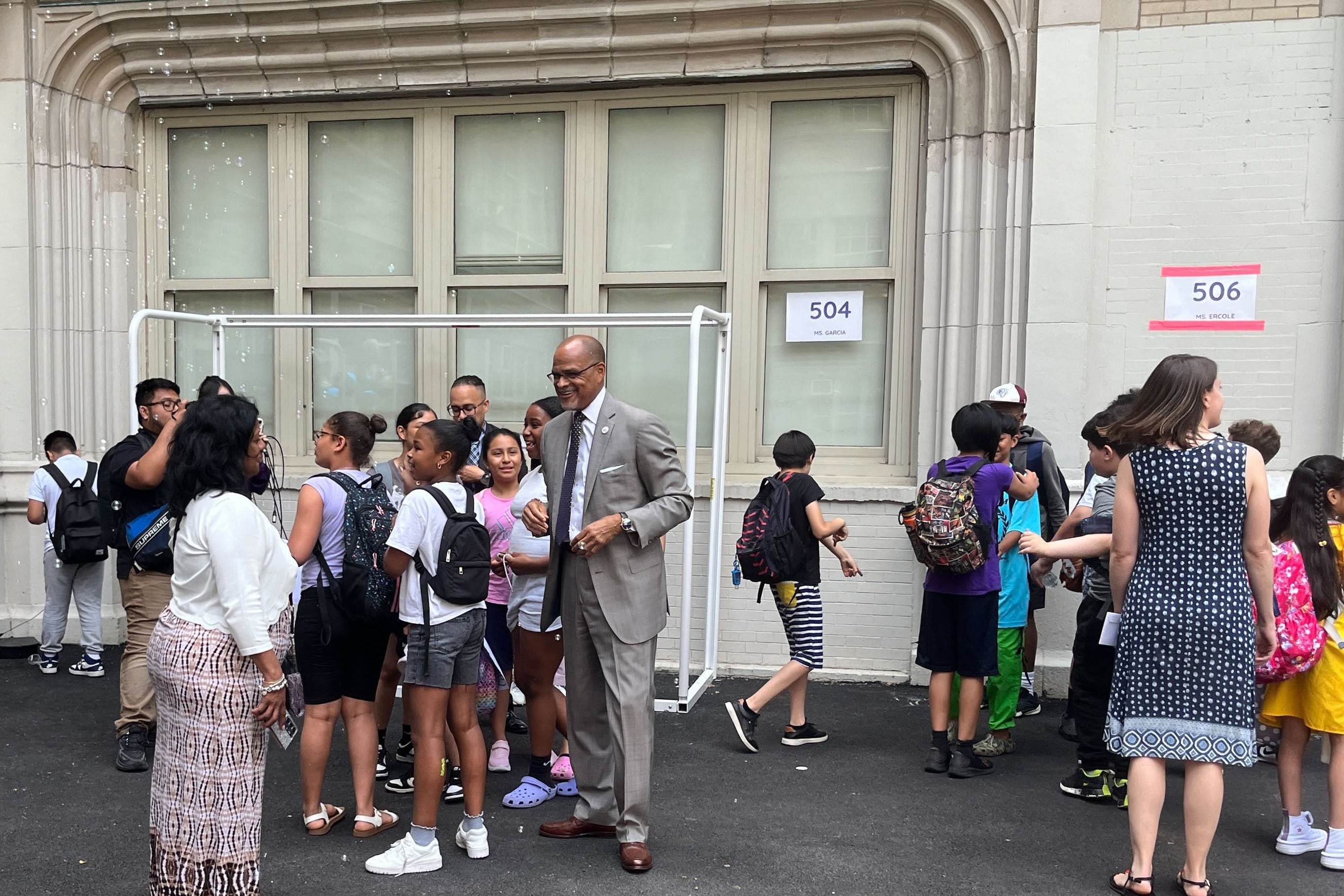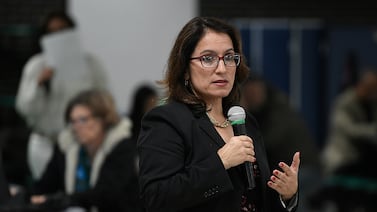Sign up for Chalkbeat New York’s free daily newsletter to keep up with NYC’s public schools.
New York City schools Chancellor David Banks may announce a cell phone ban for the nation’s largest school district “within the next two weeks,” he told reporters on Wednesday.
“You’re going to hear, within the next two weeks, the big announcement, but I will tell you we are very much leaning towards banning cell phones,” Banks said outside of P.S. 165, on the Upper West Side of Manhattan, as kids were dismissed for the last day of school. “We’re working out the kinks on this, and we want to make sure that we do it right.”
The move comes as momentum is swiftly building around school cell phone bans. The board for Los Angeles public schools, the country’s second largest district, voted last week to ban phones and expects to implement a plan in January 2025. Gov. Kathy Hochul last month said she was mulling a statewide school cell phone ban. And in a New York Times op-ed last week, U.S. Surgeon General Dr. Vivek Murthy called for a warning on social media platforms, and said that schools should be phone-free spaces.
Banks first mentioned the two-week timeline on NY1.
New York City currently allows principals to set their own policies on cell phones, after a citywide prohibition was dropped in 2015.
But in recent weeks, Banks has raised alarm over the harmful effects of cell phones on student mental health and learning. He has also pointed to safety issues, previously stating some students have used phones to arrange after-school fights.
“I can’t think of any good reason why kids would actually have their phones while they’re in school,” Banks said on Wednesday.
Banks previously said he’s been talking with “hundreds” of principals, and they have overwhelmingly told him they’d like a citywide policy banning phones.
The details of any ban are critical as to whether it will help reconnect students with their schoolwork — and each other, according to results of a Chalkbeat survey.
Most schools across the five boroughs already have bans in place, but they differ dramatically. Some schools mandate their students carry around Yondr pouches, cloth cases for phones that are locked from morning to dismissal. Others collect and store phones during school hours. Still other schools have policies on paper that ultimately put the onus on teachers to enforce – and many students and educators said that often leads to a patchwork of policies.
None of these approaches is foolproof, according to educators, parents, and students. To avoid the pouches or collection systems, kids might use “dummy” phones or say they forgot to bring their devices, teachers and parents said. Nonetheless, many educators are hungry for a clear and consistent policy.
Any ban would need to address not only the school-level logistics of collecting or storing cell phones but also the concerns of parents, who are often prime offenders of contacting kids during the school day.
“We know [students] need to be in communication with their parents after school,” Banks said, “and if there’s something going on during the day, parents should just call the school the way they always did before we ever had cell phones.”
Banks recently told parents in Brownsville that he read “The Anxious Generation,” a new book by Jonathan Haidt, a New York University Stern School of Business social psychologist and New York City public school parent. In the book, Haidt makes a strong case for phone-free schools. He also recommends that parents not give smartphones to students before high school and prohibit the use of social media before age 16.
The chancellor’s latest comments on cell phones represent a relatively recent shift in his views.
“I’m not sure that we’re at the point yet where we’re talking about banning the cell phones,” he said when Chalkbeat asked about the possibility of a citywide ban in March. “It’s a very, very difficult thing to enforce, number one. Number two, I want to make sure schools are figuring out ways to better engage kids in more beneficial uses of technology, including their phones.”
Antoine Zoundi, a parent of a first and fourth grader at P.S. 165, said he was in favor of a school cell phone ban. His kids do not yet have mobile phones — and he doesn’t anticipate allowing them to have devices until they’re 15 or 16, he said — but he can already see how phones are making it harder for students to concentrate on schoolwork.
The dad, who lives in the Bronx, wasn’t concerned about needing to reach his children during the school day, saying he could reach out to the school.
“When I want to get in touch with my child,” he said, “I have to get in touch with the school because they are responsible for the safety of the child during this time of school hours.”
The parent of another student at P.S. 165, who asked not to be identified for privacy reasons, added that she’s hoping to see the city adopt a cell phone ban in schools.
“Recently, I was on a field trip with my fourth grade son and his friends,” she said of a school trip to a nearby playground. “Some of them, instead of playing games, they were just on their phones.
“They’re so young for that,” she added. “I don’t think they need a phone at school.”
Julian Shen-Berro is a reporter covering New York City. Contact him at jshen-berro@chalkbeat.org.
Amy Zimmer is the bureau chief for Chalkbeat New York. Contact Amy at azimmer@chalkbeat.org.






